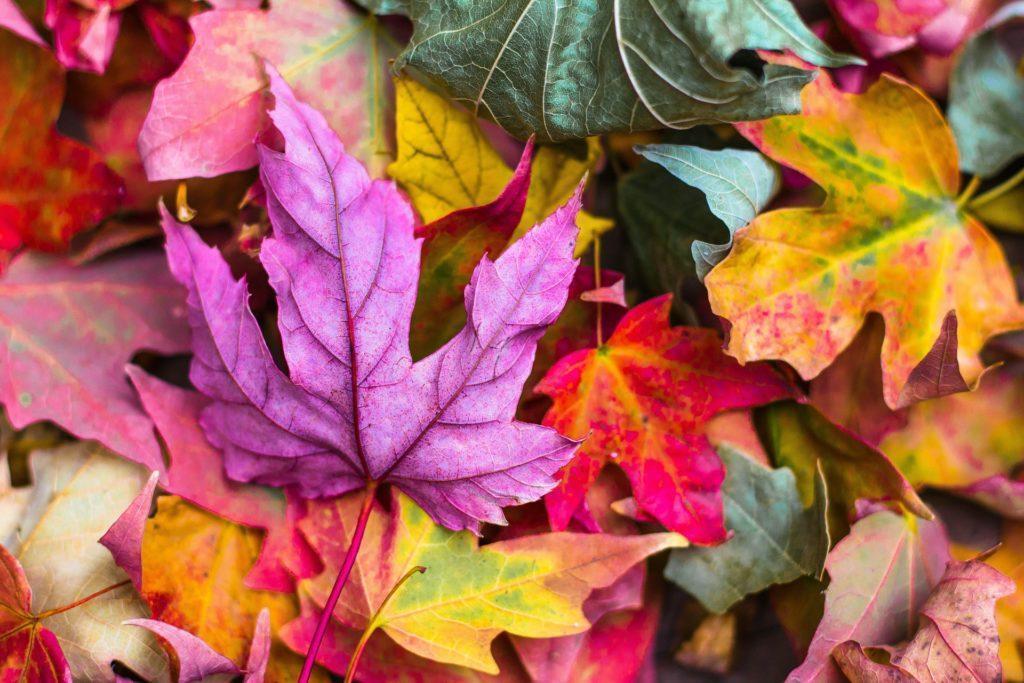Cozy but still Can't Sleep?
Fall is finally Here! Leaves are turning and temperatures dropping. Months of beach-body diets, grueling workouts, and too-hot-to-sleep weather—finally done. Time for comfort food, cozy fires, silly socks, and snuggling up under fluffy comforters, right? But no. You're cozy, but you still can't sleep. So why aren’t you snug as a bug and sleeping like a baby? Simply put, Tis the season…
Seasonal changes bring sleep challenges

Americans are crazy about Fall. It seems 29% of us prefer the Autumn climate which makes Fall our favorite season. We find joy in the vibrant color, aromatic scents & holiday cheer—we embrace the relief of milder temps… and yet… we begin to lose sleep. Why is that?
Many of us just can't get comfortable
It's impossible to sleep when you're uncomfortable or experiencing chronic pain. That means the estimated 31 million American adults with joint or nerve pain, are already losing sleep. Seasonal changes in temperature, humidity and barometric pressure, are guaranteed to increase those pain levels, and worsen their quality of sleep.
It's a Fact:
People who are able to sleep well, experience less pain.
yet It's also a fact that people in pain, cannot sleep.

How do you get the sleep you need when pain is keeping you awake?
If you can’t fall asleep, or have continually interrupted sleep, you’re going to need help. Talk with your doctor—they may be able to recommend something that will help you sleep while you’re in treatment to manage your pain.
Proper Breathing is Essential
Late-year weather systems also increase symptoms for anyone suffering from OSA (Obstructive Sleep Apnea.) This condition, which affects 1-in-15 adults, causes your breathing to stop-and-start while you’re sleeping.
When you can’t breathe right, you can’t sleep right. If you or your partner observe any of the following, it’s probably time to see a doctor and get treatment:
- Snoring so loud it disturbs your sleep, or that of others
- Waking up because you are gasping or choking
- Pauses in your breathing while sleeping
- Excess daytime drowsiness; causing you to fall asleep while working, or performing tasks like driving a vehicle
Both you and your partner deserve a good night’s sleep. Seek help to overcome any sleep disorder that’s preventing you from getting the sleep you need.
More Seasonal Sleep Disrupters & How to Manage Them
- Allergies and other Seasonal Maladies
- Turning Back the Clock
- Seasonal Affective Disorder
Adapting to atmospheric changes is one thing—but Fall brings even more seasonal disruptions like body clock re-sets and immune system challenges. Tis the season of allergies, colds and flu, after all… as well as daylight savings time… and something known as SAD.
Allergies
40% of us battle allergies which are known to impair every aspect of our sleep. In the Fall, Ragweed, mold spores and decaying leaves on the ground, provoke symptoms ranging from mild to severe. This can leave us miserable all day and half the night.
When these allergens enter nasal passages, they trigger symptoms that affect one’s ability to breathe properly and tend to worsen in the evening. This of course limits our ability to get good sleep.
Avoiding allergy triggers will ease suffering. Try these tips:
- Keep your windows closed to block out pollen, dust, and mold-filled air.
- Make sure to change the filters in your air system to avoid dust mites.
- Remove floor coverings that don’t dry quickly and could attract mold.
- Finally, stay indoors on very windy days.
Colds, Flu & other bothersome bugs
Whether it’s a cold, a sinus infection, or some other bug, you’re sure to have trouble sleeping. You may fall asleep, but can you stay asleep? Impaired breathing, disruptive coughing, aching muscles--probably not.
Supplementing any medications with practical measures will help ease your discomfort so you can rest and a recover faster. Try these:
- Drink something warm 60-90 minutes before bed to loosen congestion.
- Try a nasal decongestant to reduce swollen nose tissue and decrease mucus
- Gargle with salt water to soothe a sore throat and inhibit further infection
- Set your thermostat to 60-67 for a more comfortable sleeping environment
- Slightly elevate your head to avoid mucus build-up that can trigger coughing
An ounce of Prevention...
Kick-up your immunity to manage all of the above issues before they take hold. Begin now by getting a full night’s sleep–every night. Anything less than 6-hours per night leaves your immune system more vulnerable. Make it a priority—From now on, no matter what season it is, Tis the Season for Great Sleep!
Tis the season to Re-set your Clocks
We’re not just talking about the 1-hour time change to Daylight Savings here. Seasonal changes disrupt sleep cycles which puts our immune systems at risk.
Our Circadian rhythms are produced by natural factors within the body which are primarily influenced by exposure to light. Shorter days bring less sunlight; lower our Vitamin D levels and throw sleep cycles out of whack.
When the body’s internal clock isn’t producing the proper signals, we have difficulty falling asleep, and staying asleep. Sleep may be fragmented or may just generally be low-quality sleep that doesn’t leave us feeling rested. How do you fix it?
Quick Sleep-Clock Re-set
There’s a long list of common-sense measures for regulating sleep patterns but these will help perform a quick re-set:
- Set your alarm to wake up every day at the same time; your body will naturally adjust to the new rhythm
- Make sure you’re getting plenty of bright light each day
- Get plenty of regular exercise
- Used properly, Melatonin helps to reschedule Circadian Rhythms—consult a sleep specialist to see if this is a good option for you
Take charge of regulating your sleep cycles. Left unchecked, disrupted Circadian rhythms—and the resulting poor sleep, can affect both your physical and mental health.
Tis the season for beating the Blues
Seasonal Affective Disorder is a… Grinch
SAD (Seasonal Affective Disorder) affects 6% of the population. It is a type of mood disorder that results from lack of sunlight and wreaks havoc on millions of otherwise mentally healthy folks at a particular time of the year. Most often it arrives in the Fall.
Fatigue, attention deficit/brain fog, general crankiness, trouble sleeping/oversleeping; are among the unwelcome signs you may me suffering from SAD.
SAD’s disruption to the body’s internal clock alters chemicals in the brain & body; and leaves one feeling sullen, lethargic and disinterested in daily activities—no way to gear up for the approaching holiday festivities! It may also be the reason you’re eating enough carbs and sweets to stuff a Santa suit.
This disorder is not to be taken lightly—that said, there are medical treatments as well as positive self-care actions for managing symptoms with less stress. Here’s what to do if SAD comes knocking on your door this season:
Seek professional advice
While some cases are long-term, most appear late in the Fall and are gone come Spring. That ‘s good news for folks experiencing annoying minor adjustment to shorter days—but not so much for those dealing with severe depression/anxiety and lack of quality sleep for half the year.
Light therapy, medication, and psychotherapy treatments are the usual protocols for managing SAD. If you’re feeling blue and unable to cope with your symptoms, and suspect SAD is the cause; it’s best to consult a professional to get you back on track.
Changing yourSelf changes your sleep
It’s not just people with SAD who are unhappy when they’re sleep deprived. Tis the season for joy and celebrations—and you can enjoy yours more by getting better sleep! How to begin…
Treat yourself better
Make sure to give extra attention to your general wellness during the seasonal changes. Self-care is critical when we’re feeling a bit blue due to shorter days and reduced light exposure. Think of your whole person and take actions that support your body, mind and spirit. Following these tips will help:
Get your Vitamin D
Spend a little time outdoors each day. Keep your house well lit, and when indoors, sit close to a bright window.
Eat a wholesome diet and make sure to boost your vitamin D blood levels with healthy foods like wild caught fish, yogurt, and orange juice. Supplements are helpful too.
Manage your Pain
When atmospheric conditions put pressure on your joints and nerves, try supplementing your diet with anti-inflammatory nutrients. Green leafy vegetables, nuts, fatty fish, berries, cherries, oranges and turmeric are good options.
Make an Exercise Plan
Exercise regularly. Make a plan that will work for you and stick to it. When possible, exercise outdoors. Walking is a great choice that strengthens your body and relaxes your mind.
Get your Relaxation
It’s virtually impossible to get sleep when you’re not relaxed. Pink noise is a good listening choice for winding down; it's a proven brain relaxer and can help you sleep better. You can also try relaxation techniques like meditation; music or art therapy, or maybe a long hot bath. Essential oils work wonders and they smell nice too.

Schedule your Sleep
We’re creatures of habit and while we can’t control the weather, we can manage our behaviors to reduce stress. Keeping to a regular sleep schedule is critical—so make whatever seasonal adjustment is needed but set a schedule and keep it consistent.
Tis the season for new beginnings
Here's a quick 3-day Sleep Reset. Make the changes necessary to get the most out of the season… and enjoy the resulting good sleep—and good health, they will bring you!
Sleep well, friends...
Resources:

































